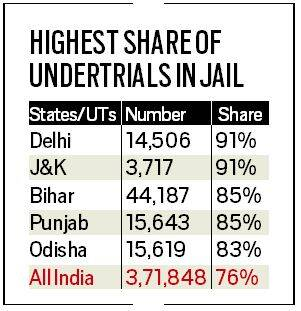Description

Copyright infringement not intended
Context - According to the National Crime Records Bureau (NCRB), about 76% of all prisoners in India are undertrials.
Details
- According to the latest available data released by the National Crime Records Bureau (NCRB) for 2020, about 76% of all prisoners in India are undertrials, and about 68% of them are either illiterate or school dropouts.
- Most of the undertrial prisoners are “poor or from ordinary families”.
- Of the total 4,88,511 prison inmates, 3,71,848 were found to be undertrials. Among the undertrials;
- About 20% were Muslims, while about 73% were Dalits, tribals or OBCs.
- Delhi and Jammu and Kashmir were found to have the highest ratio of undertrials in jails at 91%.
- Nearly 27% of all undertrials were found to be illiterate, and 41% had dropped out before Class 10.
- The delay in the verdict of cases creates disillusionment among litigants and undermines the capability of the judicial system to ensure justice efficiently and effectively.
Concern
- Over 31 million cases are pending in Subordinate Courts across the country.
- Case pendency Hurts investors’ confidence.
- Economic activity is getting affected by high pendency and delays across the legal system.
- It adds a burden on Courts and collaterally harms other litigants.
- It increases project costs and delays projects.
- Slows down administrative processes, delaying decision-making.
- Diversion of precious resources.
- Effects ease of doing business.
Steps by the Government
- Adoption of “National Litigation Policy 2010” to transform government into an Efficient and Responsible litigant.
- All states formulated state litigation policies after National Litigation Policy 2010.
- Legal Information Management and Briefing System (LIMBS), was created in 2015 with the objective of tracking cases to which the government is a party.
- The Supreme Court advised the centre that criminals sentenced to imprisonment for 6 months or a year should be allocated social service duties rather than be sent to further choke the already overflowing prisons.
Steps need to be taken
- National Litigation Policy should be revised.
- Address all 3 stages of dispute:
- Pre-litigation
- Litigation
- Post litigation stage
- Establish Fair accountability mechanisms, Consequences for violation must be provided.
- Appointment of a Nodal Officer to regularly monitor the status of the cases in every department.
- Promotion of alternative dispute resolution mechanisms to encourage mediation.
- Coordinated action between government and judiciary.
- Judicial capacity should be strengthened in the lower courts to reduce the burden on higher courts.
- Increase expenditure on the judiciary.
- Improve courts case management and court automation system.
- Create subject-specific benches.
- Tax departments must limit their appeals as their success rate is less than 30% at all three levels of the judiciary.
- Robust internal dispute resolution mechanisms
- Step by step online dispute resolution must be adopted as done by the Ministry of Consumer Affairs.
- Judges should write Shorter and more Pointed judgments.
Way Forward
- Courts need to monitor the progress of Cases based on urgency and type of Case.
- Courts must set a time limit to dispose of certain types of Cases.
- Understand why Some Courts perform well despite a Shortage of judges and adopt Such Courts as role models.
- Analytics tools can be developed in a manner that helps the judges monitor Cases based on parameters Such as how long an accused has been in judicial custody, Cases that can affect the General public, and Cases that have been long pending.
- Alternative methods should be used for dealing with non-criminal offenders and petty criminals.
https://indianexpress.com/article/india/76-per-cent-prisoners-are-undertrials-ratio-is-highest-in-delhi-jk-7900089/













